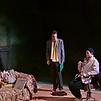: Interview with Jean-Pierre Vincent and Bernard Chartreux
Interview with Jean-Pierre Vincent and Bernard Chartreux :
To begin, what is the story of Derniers remords avant l'oubli ?
JPV – It's a Sunday in the country, in the middle of the 1980's, in a house where, fifteen years earlier, three of the characters lived a love story, a sexual revolution. Then they separated. Pierre still lives alone in the house. Hélène and Paul got married separately, in other places. Today, they have returned, with embarrassed spouses and impertinent child, to discuss the sale of the house, previously purchased jointly and which has gained value, because they need money. But have they really come for that? In the cupboards, there are sentimental skeletons, dead ideals, secrets, and remorse.
Jean-Pierre Vincent, in one of your first working notes, you insist on the importance of silence, or rather the silences, in Lagarce...
JPV - Yes, in this play in any case. In the first version, there was like uninterrupted gabbling, separated by commas. Rare full stops. The final version introduced paragraphs, indented lines, which obviously equalled so many silences. Now, in fact, in Derniers remords, the heart of the story is silence. A silence which lasts for years, that must be burst like an abscess. The characters, in improvising their attempts to clear the air, make blunders, remain broken down, and constantly attempt to make up for their clumsiness …
BC - Silence, in Lagarce, is also a form of politeness. As if the primary objective, minimal and necessary, the objective-condition-of-the-possibility-of-any-objective that Lagarce fixed for his characters, was to be honest, to be honest with themselves, with others, with the world… And what is moving is that they don't succeed. They stubbornly search for the right word, miss it, and each failure re-launches the need for corrections, infinitely minor in the end, because words, despite all our efforts, are always a little wrong, always betray a little. Hence all these wounds, inflicted on themselves and around them.
JPV – There is like a strange, unending dance between good and bad faith. Between a demand for sincerity and the difficulty of expressing it. Lagarce wrote Derniers remords on the sidelines of his long work on Les Prétendants. There is a link between the two works. In both of them, we find this faltering dance between what we are trying to say, what we don't manage to say, yet what we really should say, in the end, up to the end, and all the time not saying anything, because it would be too terrible.
BC - Yes, Lagarce is like all these very polite, very gentle people: deep down he is horribly radical. And it's the same with language like with the rest: either we make compromises that we are ashamed of, or aphasia is lying in wait for us. Thus we see his characters making huge efforts to limit inaccuracy, vagueness, the carelessness of real language, but without ever, in fact, being really taken in.
The three protagonists' reunion is therefore contemporary with the time of writing. But their story goes back to 1968 in fact?
JPV – A little later. Lagarce was about eleven then ... 1968 is a trace in the play, and like all traces, it is blurred. It's the settling of scores with a generation that had trouble growing up. But all this is simply noted in the private story, which also retains its opaqueness through to the end. For example, who are the fathers of the two girls? A mystery ... It's like in all family histories, like at the notary's: there are secrets, impossible to uncover ... Have they forgotten it then, their life from before, forgotten also its consequences? Ideally, we should be just "before forgetting"...
BC - Besides, if we mark too strongly the link with 1968, we reduce the scope of the play somewhat.
JPV - French literature has always had difficulty in speaking, afterwards, about the burning collective moments of its history. Our generation talks little about the 1968 period, and we can't come to any clearer conclusions than Lagarce himself has done ... It's better to let that develop in the audience's imagination.
… If there is comedy, is it respectful of his characters?
BC – Because you've been told that Lagarce is a polite boy!... But, in fact, it's a sensitive comedy.
Sensible et retractile. The whole "we retrace our steps" side is very important in this regard – from it could come, if not happiness, at least a possibility of living together, human warmth against human warmth, if only for a time … illusion of consolation! But no, it doesn't work, it's not as easy as that to be dishonest.
JPV – When you read this text for the first time, when you work on it alone, you perceive more and more the black, desperate, misanthropic side; when you read it with others, the comic aspect surges up, indisputable, filled with this cruelty. As if a certain musical, theatrical lightening is produced from the fact of multiplying the voices. If Derniers remords was nothing but a sarcastic comedy, or if it was only a tragedy on incommunicability, it wouldn't go far ... In fact, between its two sides, solemn and light, there is all the time like a round trip, a dance ... This is a word I have often used when talking about Lagarce. Perhaps it's the right one!
Extracts from an interview, 2 December 2003
Ces fonctionnalités sont réservées aux abonnés
Déjà abonné,
Je me connecte
–
Voir un exemple
–
Je m'abonne
Ces documents sont à votre disposition pour un usage privé.
Si vous souhaitez utiliser des contenus, vous devez prendre contact avec la structure ou l'auteur qui a mis à disposition le document pour en vérifier les conditions d'utilisation.


